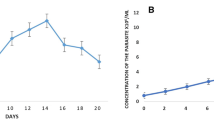Abstract
In cultures of tsetse proboscis stages during the development of Trypanosoma congolense, attached epimastigote forms multiply and give rise to free nondividing metacyclic trypanosomes. Prevention of attachment by shaking the cultures or by providing a polypropylene substratum does not inhibit epimastigote division but does prevent the differentiation of metacyclics. We conclude that epimastigote attachment forms a necessary part of the program of metacyclic development.
Similar content being viewed by others
Abbreviations
- BSA:
-
bovine serum albumin
- FCS:
-
fetal calf serum
- LUMP:
-
London University Medical Protozoology
- MEM:
-
Minimum Essential Medium
- PDT:
-
Population doubling time
- TREU:
-
Trypanosome Research Edinburgh University
References
Böker CA, Schaub GA (1984) Scanning electron microscopic studies of Trypanosoma cruzi in the rectum of its vector Triatoma infestans Z Parasitenkd 70:459–469
Bradford MN (1976) A rapid and sensitive method for the quantitation of microgram quantities of protein utilizing the principle of protein-dye binding. Anal Biochem 72:248–254
Brun R (1982) Cultivation of procyclic trypomastigotes of Trypanosoma congolense in a semi-defined medium with direct adaptation from bloodstream forms. Z Parasitenkd 67:129–135
Camargo EP (1964) Growth and differentiation in Trypanosoma cruzi: I. Origin of metacyclic trypanosomes in liquid media. Rev Inst Med Trop Sao Paulo 6:93–100
Crane MSJ, Dvorak JA (1982) Trypanosoma cruzi: spontaneous transformation by a Y strain variant in liquid medium. Exp Parasitol 54:87–92
Goldenberg S, Contreras VT, Salles JM, Bonaldo MC, DeLima Franco MP, Linss J, Lafaille J, Valle D, Morel CM (1984) Facts and hypothesis on Trypanosoma cruzi differentiation. Mem Inst Oswaldo Cruz 79:39–44
Gray MA, Cunningham I, Gardiner PR, Taylor AM, Luckins AG (1981) Cultivation of infective forms of Trypanosoma congolense from trypanosomes in the proboscis of Glossina morsitans. Parasitology 82:81–95
Gray MA, Ross CA, Taylor AM, Luckins AG (1984) In vitro cultivation of Trypanosoma congolense: the production of infective metacyclic trypanosomes in cultures initiated from cloned stocks. Acta Trop 41:343–353
Hoare CA (1972) The trypanosomes of mammals. A zoological monograph. Blackwell Scientific, Oxford
Lloyd LL, Johnson WB (1924) The trypanosome infections of tsetse flies in Northern Nigeria and a new method of estimation. Bull Entomol Res 14:265–288
Luckins AG, Rae PF, Gray AR (1983) Infection, immunity and the development of local skin reactions in rabbits infected with cyclically-transmitted stocks of Trypanosoma congolense. Ann Trop Med Parasitol 77:569–582
Molyneux DH (1977) Vector relationships in the Trypanosomatidae. Adv Parasitol 15:1–82
Molyneux DH (1983) Host-parasite relationships of trypanosomatidae in vectors. Curr Top Vector Res 1:117–148
Pan SC (1978) Trypanosoma cruzi: Intracellular stages grown in a cell-free medium at 37‡ C. Exp Parasitol 45:215–224
Paul J (1970) Cell and tissue culture, 4th ed. E & S Livingstone Ltd, Edinburgh, London
Roger M, Viens P (1986) In vitro production of metacyclic forms of Trypanosoma musculi and their infectivity in CBA mice. J Protozool 33:87–89
Roger M, Viens P (1987) Trypanosoma musculi: influence of uric acid on in vitro formation of metacyclics. Parasitology 95:531–535
Ross CA (1987) Trypanosoma congolense: differentiation to metacyclic trypanosomes in culture depends on the concentration of glutamine or proline. Acta Trop 44:293–301
Ross CA, Gray MA, Taylor AM, Luckins AG (1985) In vitro cultivation of Trypanosoma congolense: establishment of infective mammalian forms in continuous culture after isolation from the blood of infected mice. Acta Trop 42:113–122
Author information
Authors and Affiliations
Rights and permissions
About this article
Cite this article
Hendry, K.A.K., Vickerman, K. The requirement for epimastigote attachment during division and metacyclogenesis in Trypanosoma congolense . Parasitol Res 74, 403–408 (1988). https://doi.org/10.1007/BF00535138
Accepted:
Issue Date:
DOI: https://doi.org/10.1007/BF00535138




